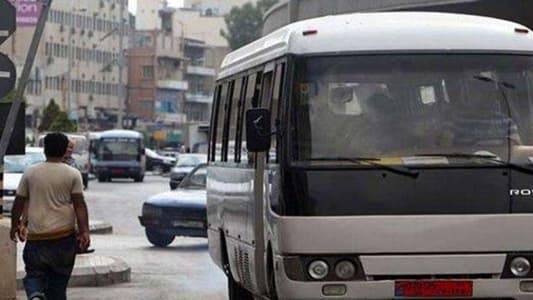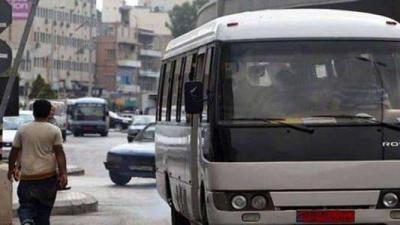Using a private car as a means of transport in the Land of the Cedars has become a real burden that everyone tries to avoid or lessen. With the chaos of public transportation (governmental) and its absence, citizens have turned to other solutions, sometimes technological and innovative but sometimes dangerous as well, to get to their destinations. Between smart transport apps like Uber, Careem, Bolt, and others, and popular "tuk-tuks" and motorcycles, they are looking for a "plentiful" and less costly means of transport.
With the continuous rise in fuel prices, Lebanon is experiencing a deepening transportation crisis that burdens drivers, passengers, families, students, and employees—every Lebanese who needs to commute daily. The transportation crisis threatens to worsen and become the fastest means of exacerbating the collapse unless the government rushes to activate a real and effective transportation plan, so its promises do not remain mere ink on asphalt. In the absence of this plan, the weary citizens are trying to find solutions in their own way, even at the expense of their safety.
**Transportation Costs... A War of Attrition**
The cost of “service,” which is the popular means of transport adopted by Lebanese that lies between buses and taxis, is expected to rise significantly, jumping to 80,000 LBP after having experienced several successive increases recently. If we assume that anyone going to work needs more than one “service” round trip, we can imagine the amount spent by a worker or employee to reach their workplace. This amount is undoubtedly much higher than the daily transport allowance raised by the government to only 95,000 LBP, considering that they have fulfilled their duty to the citizens, while the cost of their commute via public transport or their private cars far exceeds that value.
The burden of commuting has turned into a pressing problem that threatens to impact the overall living situation in Lebanon, especially in the absence of an organized transportation plan that successive governments have promised without bringing it to fruition. Although funding for the promised transportation plan had been secured from the World Bank, it was instead used to fund what is known as the "financial card," created to assist the poorest families, whose fate remains unknown.
The transportation sector, split between state-owned and privately-owned public transportation, including buses, vans, and small service cars, has drowned in chaos and random pricing. Despite efforts from the Ministry of Transport to impose an official fare, part of the private sector does not comply, often leading unions affiliated with Lebanon's public transport sector to protest and strike for fare increases and improved rights for public drivers. The private sector has struggled to align with a comprehensive transport plan to serve as its cornerstone amidst the state’s inability to provide effective transportation means.
**French Gift Buses in the Eye of the Crisis**
The Lebanese state, which had no more than 45 buses, received a donation from France of fifty advanced buses, but so far it has been unable to put them into service for various reasons, not least of which is the lack of qualified drivers to operate them and the Ministry of Transport’s reluctance to hire new drivers and ticket collectors and bear the cost of their salaries amid the current hiring freeze. They are looking for a way to contract drivers from the private sector through tenders and terms of reference. However, even after six months, these French buses remain out of service, and the Lebanese have not benefited from them despite their urgent need. The transportation plan is still in search of funding.
If the Lebanese wish to use private transport buses, they do not know their timings, as they do not operate according to a specific schedule, forcing them to wait for a van, bus, or even a service to pass by at random, making it impossible to schedule their arrival to work or to estimate the associated costs.
While transport apps worldwide have seen considerable success, they face multiple issues in Lebanon, including the high cost of internet subscriptions for drivers and frequent outages. The operating company imposes pricing that does not align with the prevailing reality and the price of fuel. As a result, many drivers using these apps are opting to switch to motorcycles, which consume less fuel, presenting them to customers as an alternative to cars. For passengers using these apps, they view them as a life raft, as they remain less expensive than regular taxis or services, with many preferring to order a motorcycle despite the associated dangers, particularly in the absence of safety measures enforced by traffic police. Alarmingly, unregistered motorcycles operated by non-Lebanese individuals, whose owners are unknown, have entered the fray, posing risks to passengers' safety and exposing them to theft or assault.
**Motorcycles... Like "Fire in Dry Grass"**
As necessities permit prohibitions, unsafe transport methods are increasingly used by residents in Lebanon. Seeing motorcycles carrying entire families is no longer surprising, and as Fouad Al-Samdi, one of the officials at the "Yaza" association focused on road safety, notes, “It is extremely dangerous and provocative because, in this case, the head of the family drives his family into the unknown or even to potential disaster. A small mistake by the driver could result in the motorcycle overturning, injuring everyone on it. Recently, a family of four on a motorcycle near the Sports City experienced an accident in which the mother and her child tragically died. Another incident occurred in the Ouzai area where a child fell off and died in a painful accident, while in a similar incident, an infant not more than four months old died after falling off a motorcycle in which he was riding with his parents.”
Using a motorcycle to save on fuel and enable quicker commutes has become very common in Beirut, leading to small motorcycles flooding the streets of the capital and surrounding areas. Many of their riders do not possess a driver’s license, have not learned basic road rules, and do not wear helmets or protective gear, thus posing a danger to themselves and others, both drivers and pedestrians.
**Tuk-Tuks... A Problem and Solution**
Even in the Bekaa and North regions, as well as certain streets in Beirut, the sight of tuk-tuks has become familiar. This semi-primitive transport means is used in impoverished countries with high population density. This practical means is significantly cheaper than taxis or services and is a dream solution for some areas in terms of transport and reaching work.
Um Ghazi, a Bekaa woman, states that she has found in the tuk-tuk a solution to her problems; she sends her children to school in the morning using this method and brings them home at noon, making multiple trips back and forth to pick up more students instead of using a school bus, charging parents a quarter of what they would pay for a bus. Throughout the day, her husband uses the same tuk-tuk to distribute bread from bakeries to shops, and it's acceptable for him to take on some passengers for a fare. "The tuk-tuk has become our source of income, and its rise in the Bekaa region especially indicates the area's necessity for a cheap and popular means of transport."
However, who guarantees the safety of small students in this means not originally designed for long-distance travel or carrying multiple passengers? Who assures that the driver is experienced enough to avoid dangerous traffic accidents that could harm students and unprotected passengers?
**Transportation Paralyzes Government Sector**
The latest innovation Lebanese have turned to is what is known as Car Pooling, or sharing one car among several people headed to the same place. There are now over a few apps that adopt this means. However, according to one of its founders, it has not received much attention despite offering passengers more than 70% savings on transport costs. The reason is that Lebanese are still unaccustomed to the culture of shared transportation and prefer using their private cars or traveling alone via transport means. However, these apps could address a significant issue, particularly for those commuting long distances from areas to the capital, for instance.
Many have given up using their cars for daily commutes and have started going to work two or three times a week, including public sector employees whom the state and its administrations have been lenient with, allowing them to shorten their weeks to two days to save on transport costs. This leniency in reaching their workplaces to perform government duties has significantly impacted their productivity and their ability to manage people's affairs across various fields.
Amidst this chaos, regardless of the Lebanese's attempts to innovate solutions, transportation remains a pressing crisis, adding to the tinderbox of social explosion that could occur at any moment. The cost of commuting is a heavy burden on every individual, as if the Lebanese are engaged in an open and harsh war of attrition.




